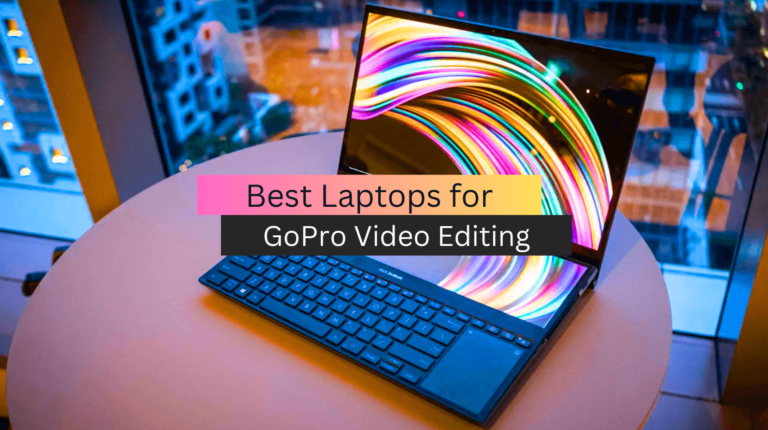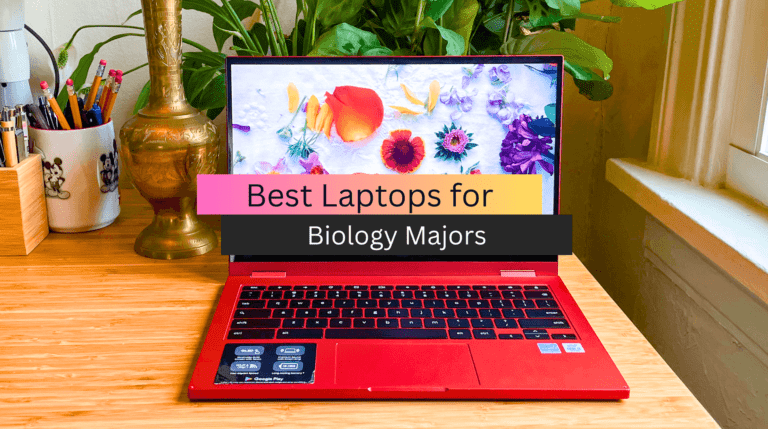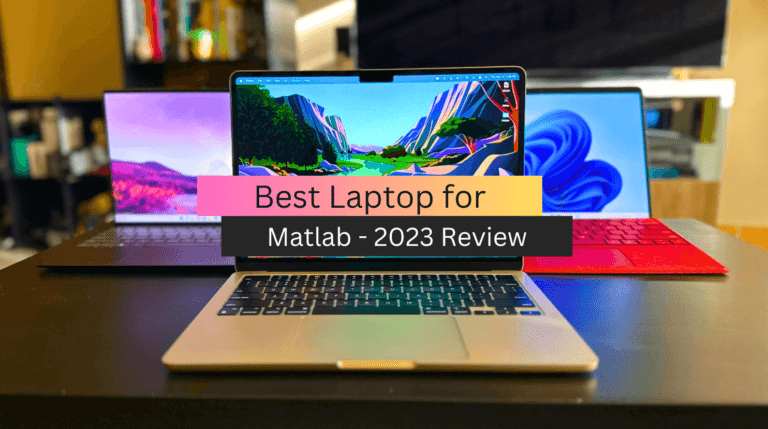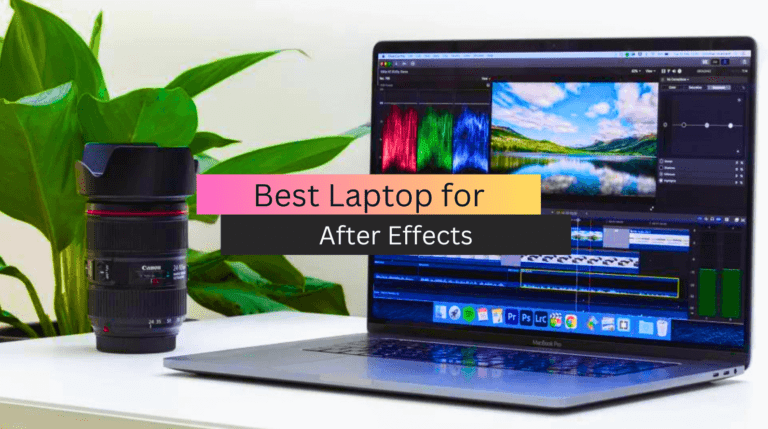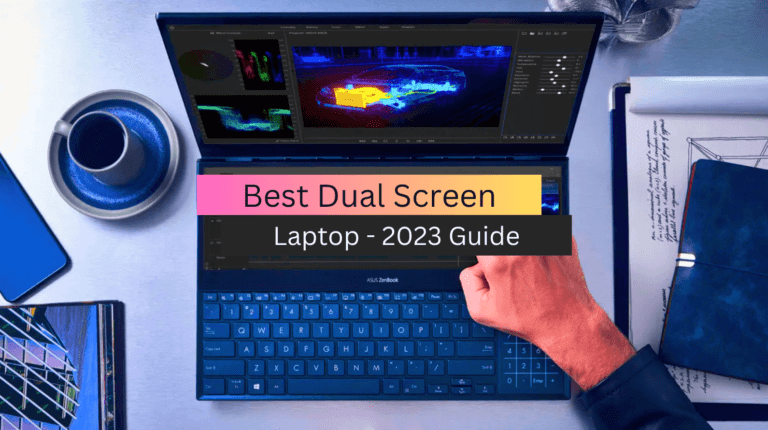Best Laptop for DevOps Engineers
Are you a DevOps engineer searching for the perfect laptop to boost your productivity and streamline your workflow? Look no further, as we have compiled a list of the best laptop for DevOps engineers. As a DevOps engineer, you require a powerful and versatile machine capable of running multiple applications and handling complex tasks simultaneously. You need a laptop that is reliable, fast, and has a long battery life to keep up with your busy schedule.
With so many laptops on the market, it can be overwhelming to choose the perfect one. However, we have done the research for you and narrowed down the options to the top laptops that cater to the specific needs of a DevOps engineer. Keep reading to find the best laptop that meets your requirements and enhances your productivity. You may read also Touchscreen Laptops Vs Non-Touchscreen Laptops
Top 5 Best Laptops for DevOps Engineers in 2023
1. LG Gram 16Z90P Laptop – Powerful and Reliable Laptop
The LG Gram 16Z90P Laptop is a powerful device that is designed to meet the needs of content creators, designers, editors, and multitaskers. With a 16-inch WGXGA (2560 x 1600) IPS LCD, DCI-P3 99% color expression, and Intel Xe Graphics, this laptop delivers high-resolution content creation and editing performance.
The laptop is powered by an 11th generation Intel Core i7-1165G7 Processor, which is part of the Intel Evo Platform. This processor is designed to provide excellent performance for memory-intensive content creation, designing, editing, and multitasking. Additionally, the laptop comes with 16GB LPDDR4X 4266mhz RAM, which offers a high level of performance for memory-intensive tasks.
One of the standout features of this laptop is the 1TB PCIe M.2 NVMe SSD, which provides dependable storage that is accessible in a flash. This makes it easy to store and retrieve large files, such as videos, images, and audio recordings, without any lag or delay.
Connectivity is also a key feature of the LG Gram 16Z90P Laptop. The device comes with two USB-C ports with Thunderbolt 4 support, two USB-A 3.2 ports, a full-size HDMI port, a microSD card reader, and a 3.5mm audio jack. This means that users can connect to a range of devices, including external monitors, keyboards, mice, and audio equipment, with ease.
Pros:
- High-resolution display with DCI-P3 99% color expression for excellent color accuracy and vibrant visuals.
- Intel Evo platform with 11th generation Intel core i7-1165G7 Processor and Intel Xe Graphics delivers powerful performance for demanding tasks like content creation and editing.
- 16GB LPDDR4X 4266mhz RAM offers speedy memory performance for multitasking and running memory-intensive applications.
- 1TB PCIe M.2 NVMe SSD provides fast and reliable storage for quick access to files and programs.
- Multiple connectivity options including Thunderbolt 4 support, USB-A and USB-C ports, a full-size HDMI port, a microSD card reader, and a 3.5mm audio jack make it easy to connect to various devices and peripherals.
- Its slim and lightweight design makes it highly portable and easy to carry around.
Cons:
- Windows 10 operating system may not be preferred by some users who prefer a different operating system.
- Integrated graphics may not be sufficient for running demanding games or graphics-intensive applications that require a dedicated graphics card.
2. Apple MacBook Pro – Best Programming Laptop with Exceptional Battery Life
The Apple MacBook Pro is a sleek and powerful laptop designed for professionals who need a high-performance device to handle demanding tasks. With a ninth-generation 6-Core Intel Core i7 Processor and AMD Radeon Pro 5300M Graphics with GDDR6 memory, this laptop delivers blazing-fast processing speeds and exceptional graphics performance.
The MacBook Pro features a stunning 16-inch Retina Display with True Tone technology that provides crisp and clear visuals, making it perfect for tasks such as video editing and graphic design. The Touch Bar and Touch ID provide easy access to frequently used functions and enhance security by allowing users to log in with their fingerprints.
This laptop is equipped with an ultrafast SSD, which allows for lightning-fast data access and app loading times. Additionally, the Intel UHD Graphics 630 ensures smooth and efficient graphics processing.
The MacBook Pro comes with a six-speaker system that includes force-canceling woofers, providing an immersive audio experience that is perfect for watching movies, listening to music, or video conferencing. The laptop also features four Thunderbolt 3 (USB-C) ports, providing fast and versatile connectivity options.
The MacBook Pro has up to 11 hours of battery life, making it perfect for users who need to work on the go without worrying about running out of power. Additionally, 802.11ac Wi-Fi provides fast and reliable internet connectivity, ensuring that users can stay connected wherever they go.
Pros:
- Powerful Processor: The ninth-generation 6-Core Intel Core i7 Processor of the MacBook Pro provides excellent performance, making it suitable for demanding tasks such as video editing and 3D rendering.
- Stunning Display: The 16-inch Retina Display with True Tone technology provides an immersive visual experience, making it suitable for watching movies, editing photos, and designing.
- Touch Bar and Touch ID: The Touch Bar and Touch ID provide an intuitive and secure way to access frequently used apps and authenticate purchases.
- Dedicated Graphics: The AMD Radeon Pro 5300M Graphics with GDDR6 memory ensures smooth and efficient performance while running graphic-intensive tasks.
- Fast SSD: The ultrafast SSD provides lightning-fast boot times and quick access to files, making it suitable for professionals who need to work with large files.
- High-Quality Audio: The six-speaker system with force-canceling woofers provides excellent sound quality, making it suitable for watching movies and listening to music.
- Long Battery Life: The MacBook Pro provides up to 11 hours of long lasting battery life, making it suitable for use on-the-go.
Cons:
- Expensive: The MacBook Pro is relatively expensive, making it less accessible to budget-conscious consumers.
- Limited Ports: The MacBook Pro has only four Thunderbolt 3 (USB-C) ports, which may not be sufficient for users who require multiple ports for peripherals.
- No SD Card Slot: The MacBook Pro lacks an SD card slot, making it less convenient for photographers and videographers who rely on SD cards.
- Non-Upgradeable: The MacBook Pro’s components are not upgradeable, making it difficult to extend the device’s lifespan beyond the initial purchase.
3. ASUS ROG Strix G15 – Best Laptop for Programming and Gaming
The ASUS ROG Strix G15 is a high-performance gaming laptop designed to deliver exceptional gaming experiences. It features a powerful 5th Gen AMD Ryzen 9 5900HX Processor that delivers incredible speed and performance, with a clock speed of up to 4.5 GHz. The laptop also comes equipped with 16GB DDR4 3200MHz RAM and a 1TB PCIe NVMe M.2 SSD, ensuring that you have enough storage and memory for all your gaming needs.
The laptop’s graphics are powered by an NVIDIA GeForce RTX 3070 8GB GDDR6 with ROG Boost, providing gamers with stunning visuals and smooth performance. The 300Hz 3ms 15.6” Full HD 1920×1080 IPS-Type Display offers a high refresh rate, delivering a fast and fluid gaming experience with minimal motion blur. The display’s IPS technology ensures that colors and contrast remain vibrant and consistent, even when viewed from wide angles.
The laptop’s cooling system is top-notch, featuring the ROG Intelligent Cooling thermal system with Thermal Grizzly Liquid Metal Thermal Compound. This thermal system ensures that the laptop stays cool even during intense gaming sessions, preventing thermal throttling and ensuring optimal performance.
The laptop’s design is sleek and stylish, with a black finish that gives it a modern and sophisticated look. The laptop’s keyboard features RGB backlighting, allowing gamers to customize the lighting to match their preferences. The laptop’s audio system is also impressive, featuring two speakers and smart amplifier technology that enhances sound quality and clarity.
The ASUS ROG Strix G15 runs on Windows 10 Home, providing users with a familiar and intuitive operating system that is easy to use. The laptop’s dedicated graphics card, powerful processor, and ample memory and storage make it an ideal choice for gamers looking for a high-performance gaming laptop that delivers exceptional performance and speed. You may read also Is 13 Inch Laptop Too Small
Pros:
- High-end performance: The combination of the latest AMD Ryzen 9 5900HX processor and NVIDIA GeForce RTX 3070 graphics card with ROG Boost offers top-notch performance for demanding applications such as gaming, content creation, and virtual reality.
- Fast and responsive display: The 300Hz 3ms 15.6” Full HD 1920×1080 IPS-Type Display ensures a smooth and responsive visual experience, making it ideal for gamers who demand fast-paced action without any lag.
- Large storage space: The 1TB PCIe NVMe M.2 SSD provides ample storage space for large files and applications, ensuring quick access and load times.
- High-speed RAM: The 16GB DDR4 3200MHz RAM ensures that the system runs smoothly even when multitasking or running memory-intensive applications.
- Efficient cooling system: The ROG Intelligent Cooling thermal system with Thermal Grizzly Liquid Metal Thermal Compound ensures efficient cooling, reducing the risk of overheating and system damage.
Cons:
- Expensive: The ASUS ROG Strix G15 is a premium laptop that comes with a high price tag, making it unaffordable for many users.
- Limited battery life: Due to its high-performance hardware, the laptop may consume a lot of power, resulting in a limited battery life of a few hours.
- Heavy and bulky: With a weight of 2.3kg, the ASUS ROG Strix G15 may be heavy and bulky, making it difficult to carry around for extended periods.
- Loud fans: The fans on the laptop can get quite loud under heavy loads, which may be distracting or annoying to some users.
4. Lenovo Legion 5 Gaming Laptop – Best Laptop for Software Developer
The Lenovo Legion 5 Gaming Laptop is an impressive device designed to deliver exceptional gaming experiences. The laptop boasts a 15.6″ FHD 120Hz display that delivers impressive color and clarity. The anti-glare energy-efficient IPS 250 Nit screen ensures that your gaming visuals remain clear even in bright environments.
The laptop features an AMD Ryzen 5-4600H processor, which is an ultra-low-voltage platform that provides 6-core, 12-way processing power to go. The laptop also comes with Dolby Atmos, 2x 2W Stereo Speakers, and a 720p HD camera with Privacy Shutter, making it perfect for video conferencing and online gaming.
The Lenovo Legion 5 Gaming Laptop is equipped with 8GB DDR4 RAM, which provides plenty of high-bandwidth memory to ensure smooth gameplay and the ability to run multiple programs simultaneously. It also has 1TB HDD + 256GB PCIe SSD storage, allowing you to save files quickly and store more data. This feature is especially great for major gaming, multiple servers, backups, and more.
The laptop also features a backlit keyboard that allows you to enjoy comfortable and accurate typing even in dim lighting. The NVIDIA GeForce RTX 1650Ti Graphics with 4GB GDDR6 video memory provides solid image quality for Internet use, movies, basic photo editing, and casual gaming.
The Lenovo Legion 5 Gaming Laptop comes with Windows 10 included, and it has a 4-cell Lithium- Polymer battery that delivers long-lasting performance. The laptop has a sleek black design and weighs 5.5 lbs, making it easy to carry around. It also has several ports, including 4x USB Type-A, 1x USB Type-C, 1x Headset, 1x HDMI, and 1x RJ-45.
Pros:
- The Lenovo Legion 5 Gaming Laptop has a 15.6″ FHD 120Hz display, providing impressive color and clarity for an immersive gaming experience.
- The AMD Ryzen 5-4600H Processor is a powerful ultra-low-voltage platform with 6 cores and 12-way processing, providing maximum high-efficiency power to go.
- The laptop has a large amount of storage with 1TB HDD and 256GB PCIe SSD, allowing for fast file saving and storing of more data.
- The backlit keyboard allows for comfortable and accurate typing even in dim lighting.
- The NVIDIA GeForce RTX 1650Ti Graphics with 4GB GDDR6 video memory provides solid image quality for internet use, movies, basic photo editing, and casual gaming.
- The laptop comes with Windows 10 Home pre-installed and a 4-cell Lithium-Polymer battery.
- The laptop has a variety of ports, including 4x USB Type-A, 1x USB Type-C, 1x Headset, 1x HDMI, and 1x RJ-45.
- The laptop comes with a bonus 32GB USB card.
Cons:
- The laptop only has 8GB of RAM, which may not be sufficient for running multiple demanding programs simultaneously.
- The laptop’s weight is on the heavier side at 5.5 lbs, which may not be ideal for frequent travel.
- The laptop does not have an optical drive, which may be inconvenient for users who still use physical media.
- The laptop does not have Thunderbolt 3 ports, which may limit its connectivity options for some users.
5. HP 17 Laptop – Best Laptops for Programming Students
The HP 17 Laptop is a powerful and reliable device designed to offer high performance and top-notch connectivity. With its 17.3-inch HD display, you can enjoy your photos, movies, and games in crisp, clear quality, with a resolution of 1.4 million pixels. The non-reflective and low-gloss screen ensures that you get minimal glare while working outside, making it perfect for users who are always on the go.
Under the hood, the HP 17 Laptop is powered by an 11th Generation Intel Core i5-1135G7 processor, which offers instant responsiveness and best-in-class connectivity. You can breeze through your work, gaming, or streaming activities with ease, thanks to the processor’s impressive speed and efficiency. Additionally, the device comes with Intel Iris Xe Graphics, which offer stunning visuals, making it perfect for creative professionals, gamers, and streaming enthusiasts.
The HP 17 Laptop also boasts a 256 GB PCIe NVMe M.2 SSD storage, which is up to 15x faster than a traditional hard drive, providing you with enough storage space for all your files, documents, and media. The device also comes with 8 GB of RAM, which offers higher bandwidth for improved multitasking capabilities, allowing you to work on multiple applications and programs simultaneously.
With up to 8 hours of battery life and HP Fast Charge, which takes you from 0 to 50% charge in approximately 45 minutes, you can take on the day with confidence, without worrying about running out of power. The device also comes with the familiar feel of the Windows 10 Home operating system, and the guaranteed coverage of an HP 1-year limited hardware warranty, providing you with peace of mind.
Furthermore, the HP 17 Laptop is equipped with Wi-Fi 6 (2×2) and Bluetooth 5.0 combo, which offers up to 3x faster file transfer speeds than Wi-Fi 5, making it easier for you to stay connected and productive. The HP TrueVision HD camera with dual microphones ensures that you look sharp during video calls or while catching up with your loved ones, making it perfect for remote workers and students.
Pros:
- High-quality display with 1.4 million pixels and a non-reflective, low-gloss screen for a better viewing experience.
- Excellent performance with 11th Generation Intel Core i5-1135G7 processor and Intel Iris Xe Graphics for stunning visuals.
- Fast storage with 256 GB PCIe NVMe M.2 SSD and improved multitasking with 8 GB RAM.
- Long battery life with up to 8 hours and HP Fast Charge feature for quick charging.
- Comes with Windows 10 Home operating system and HP 1-year limited hardware warranty for added convenience and security.
- Smooth wireless connectivity with Wi-Fi 6 and Bluetooth 5.0 combo for faster file transfer speeds.
- HP TrueVision HD camera with dual microphones for vibrant video conferencing.
Cons:
- The screen size of 17.3 inches may not be suitable for users who prefer a more compact and portable laptop.
- The integrated graphics card may not be sufficient for demanding gaming or graphics-intensive tasks.
- The hard disk size of 256 GB may not be enough for users who require large amounts of storage space for their files and applications.
What Features to Look for When Buying the Best Laptop for DevOps Engineers?
1. Display
As a DevOps engineer, you need to have a laptop with a display that can accommodate your daily tasks. A high-resolution display is a must-have feature to ensure that you can view and compare multiple windows, applications, and tabs side by side without eye strain or fatigue. The recommended resolution for a DevOps laptop is at least 1920 x 1080p.
In addition to resolution, color accuracy, brightness, and viewing angles are also crucial display features to consider. Color accuracy is essential, especially for tasks that involve image editing, design, and development. A laptop with good color accuracy can ensure that the images displayed on the screen are true to life and match the color output of other devices.
Brightness is another feature to consider as it can affect your productivity in different lighting conditions. If you work in a dimly lit environment, a laptop with a brighter display can help to reduce eye strain. Lastly, viewing angles play a significant role in ensuring that your work is displayed accurately and comfortably. A laptop with a wide viewing angle can prevent color distortion and maintain the same image quality regardless of the angle from which you view it.
2. Processor
When it comes to buying a laptop for DevOps engineers, one of the most important features to consider is the processor. The processor is the brain of the computer, and it determines how fast and efficiently the laptop can handle complex tasks.
For DevOps engineers, a powerful processor is essential, as they often work with large amounts of data and run multiple applications simultaneously. The processor should have a high clock speed and multiple cores to handle these tasks efficiently.
Intel Core i7 and i9 processors are popular choices for DevOps laptops, as they offer high performance and multiple cores. AMD Ryzen processors are also worth considering, as they offer similar performance and are often more affordable.
In addition to the processor, it’s important to consider the laptop’s cooling system. DevOps engineers often run resource-intensive applications that generate a lot of heat, so a laptop with an effective cooling system is crucial to prevent overheating and ensure long-term reliability.
3. RAM
RAM, or Random Access Memory, is an important factor to consider when choosing a laptop for DevOps work. It is a type of computer memory that is used to temporarily store data that the computer is currently using. For DevOps work, having enough RAM is crucial for running multiple programs and tools simultaneously without slowing down the computer.
When it comes to RAM, it’s best to have at least 16GB of RAM for DevOps work. This amount of RAM allows you to comfortably run a few virtual machines, multiple IDEs, and several browser tabs without any performance issues. However, if you plan to work on more resource-intensive tasks such as machine learning, you may need even more RAM.
It’s worth noting that RAM can usually be upgraded on most laptops, so if you find a laptop that you like but it doesn’t have enough RAM, you can always upgrade it later. Just make sure that the laptop has enough RAM slots and that the RAM is upgradeable before making your purchase.
4. SSD & Storage
Solid State Drives (SSDs) have become an essential feature to look for when buying the best laptop for DevOps engineers. With their flash memory technology, they offer faster read and write speeds, making them ideal for running multiple applications simultaneously, managing large datasets, and compiling code.
SSDs not only improve the overall performance of a laptop, but they also consume less power, which results in longer battery life. Moreover, they generate less heat and noise, making the laptop less distracting and more comfortable to use.
In a DevOps environment, where data reliability and accessibility are crucial, SSDs have a significant advantage over traditional hard drives. They do not have any moving parts, which makes them more durable and less prone to failure. They are also more resistant to shock and vibration, making them ideal for travel or remote work.
When it comes to storage, it’s essential to choose a laptop with enough space to store all your data, applications, and tools. A laptop with at least 256GB of storage is recommended, although more storage may be required depending on your specific needs. You can also opt for a laptop with an additional hard drive or SD card slot to increase your storage capacity.
5. Graphics Card
As a DevOps engineer, you may not require a high-end graphics card, but it’s essential to choose a laptop with a decent graphics card. This is because DevOps professionals often work with multiple applications and tools that require significant graphical processing power, such as visualizations and data analysis.
A dedicated graphics card ensures that your laptop can handle heavy loads and display detailed images, graphics, and charts without slowing down or lagging. Additionally, some DevOps tasks may require running virtual machines or containers, which can put a strain on the graphics card.
When choosing a laptop for DevOps work, look for models with dedicated graphics cards from reputable brands such as Nvidia or AMD. These cards come with their own memory, which helps to free up system resources and prevent bottlenecks. Ultimately, a laptop with a dedicated graphics card will help you work more efficiently and smoothly, without any lag or stuttering.
6. Battery life
As a DevOps engineer, you need a laptop that can keep up with your demanding workload and provide seamless performance throughout the day. One of the most critical factors to consider when buying a laptop for DevOps engineers is battery life. You don’t want to be tethered to an electrical outlet or be constantly searching for a charging port, as it can severely hamper your productivity.
A laptop with long battery life is a necessity, and you should look for one that can last at least 8-10 hours on a single charge. However, keep in mind that battery life can vary depending on usage and performance requirements. If you’re going to be using resource-intensive applications or running multiple virtual machines, you’ll need a laptop with a more powerful battery.
Another factor to consider is the type of battery technology used in the laptop. Lithium-ion batteries are the most common type used in laptops, as they offer a good balance between power and weight. However, newer laptops may use solid-state batteries, which provide faster charging and longer lifespan.
Conclusion
In conclusion, when looking for a laptop as a DevOps engineer, the key factors to consider are processing power, RAM, storage capacity, portability, and battery life. It is also important to look for a laptop that is compatible with the necessary operating systems and tools used in DevOps. Based on these criteria, some of the best laptops for DevOps engineers include the MacBook Pro, LG Gram 16Z90P, HP 17, and Lenovo Legion 5. Ultimately, the best laptop for a DevOps engineer depends on their individual needs and preferences, but any of these options would provide reliable and efficient performance for DevOps tasks. You may check also How Long Do iMacs Last
FAQs
How much RAM do I need for DevOps?
For basic evaluation or personal use in DevOps, a configuration with 2 GB of RAM can suffice. However, for a production server that will be used by multiple users, a higher amount of RAM is recommended. The exact amount will depend on the specific requirements and workload of the server.
Is DevOps a lot of coding?
Yes, DevOps involves a lot of coding and scripting as these are essential skills required for automating tasks, managing code repositories, and working with various tools and technologies used in the DevOps process. However, the amount of coding involved may vary depending on the specific role and responsibilities within the DevOps team.



